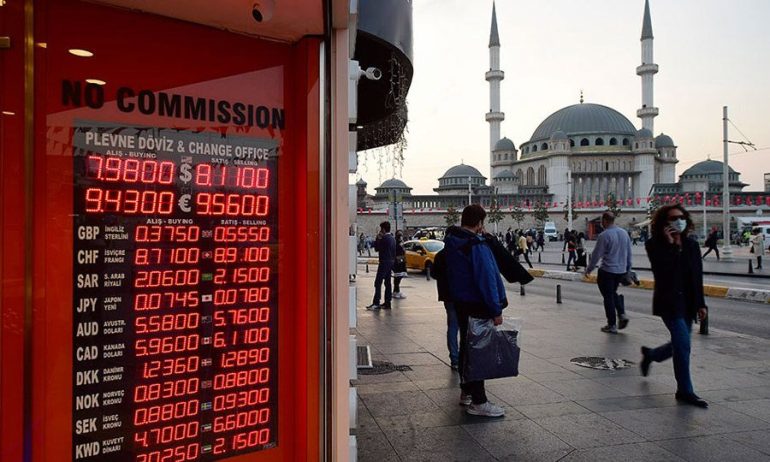Turkey cut interest rates on Thursday, leading the Turkish pound to a new record fall. This has heightened concerns that Turkish President Tayyip Erdogan's commitment to low borrowing costs will exacerbate already sharpened inflation.
The central bank reduced the one-week repurchase rate by 1 percentage point to 15%, noting the third consecutive interest rate cut under Governor Sahap Kavtsioglou, from 19% in early September.
The bank said many of the factors behind rising consumer prices were "beyond the control of monetary policy", adding that it would "consider" ending the rate cut in December.
Following Turkey's decision, the pound plunged by about 4%.
The currency has fallen more than 30% this year - to the same level as the 2018 monetary crisis - as economists fear low interest rates will exacerbate the continuing decline in inflation, with rising consumer prices already reaching an annual rate of 20 % in October.
Turkey's decision raises "questions"
"The reason they did this is questionable," said Paul McNamara, an emerging markets investor at GAM in London. He said many of the fundamentals that govern the Turkish economy seemed attractive as the country recovered from the pandemic. "The only reason for a weak pound is the political outlook," he said.
The central bank has come under intense pressure from Erdogan to ease its monetary policy, despite "inflated" inflation. Lower interest rates - and a weaker currency - tend to exacerbate inflation as it increases the price of imported goods, leading to a new vicious circle.
Erdogan, who is of the unorthodox view that high interest rates are causing, rather than calming, inflation, renewed on Wednesday his commitment to free Turkey from the "scourge" of high interest rates.
"I apologize to our friends [from the ruling party] who support [high] interest rates but I can not follow the same path as them," Erdogan said.
The central bank said rising inflation was due to "transient supply-side effects", including high global food and energy prices, which are expected to continue throughout the first half of next year.
He even said that Many developed economies continue to seek to stimulate monetary policy, in part because of expectations that rising global inflation will prove elusive in the medium to long term.
Uncharted waters
However, the easing of monetary policy by Turkey makes the country the exception among other emerging economies, which are raising interest rates.
Both South Africa and Hungary announced interest rate hikes on Thursday. The US Federal Reserve, the world's most influential central bank, is also reducing stimulus measures, which has put emerging markets under increasing pressure to raise interest rates and attract investment.
Barclay's analysts said Turkey had entered "uncharted waters", calling the recent rate cuts "counterproductive".
"Stop NOW, Erdogan"
Erdogan has faced growing calls from both the opposition and the Turkish business community to put aside his obsession with lowering interest rates in order to calm inflation and stabilize the currency, whose slump has worsened. the standard of living in the country.
"Stop NOW, Erdogan," Kemal Kilikdaroglu, leader of the main opposition party, said in a Twitter post in response to today's decision, while reiterating his call for the country to go to the polls.
The right-wing IYI party, whose support is growing in opinion polls, has accused Erdogan of leading the country to bankruptcy.
"The reasons for the monetary crisis right now are not just macroeconomic. "It's the decision-making system that gives Erdogan unlimited power," said Umit Ozlale, one of the party's vice presidents. "Everything he wants is done. That is why we are in this crisis. "It's a decision-making crisis."
Market volatility has been exacerbated by an overnight article in the country's official newspaper on foreign exchange transactions at Turkish exchange offices.
Turkish officials have dismissed frenzy speculation on social media that the move was a sign of impending capital controls. They said the directive was a small technical change to an earlier requirement for citizens to show their identity at foreign exchange offices, arguing that it was in fact a liberalization measure that raised the minimum transaction amount for such a requirement to $ 100.
Source: Financial Times
